|
As a naturalized U.S. citizen, I’ve been watching the fallout from the presidential campaign in my second home with a close and anxious eye. Many Canadians feel the same way.
Today in The Conversation Canada, Cheryl Thompson from Ryerson University says that although she’s Canadian, she feels ”the magnitude of what’s at stake in a country increasingly divided over issues of race, gender, the economy and the coronavirus pandemic.”
The 2020 U.S. presidential race was as much a cultural battle of values and ideas as it was anything else -- with the Trump presidency “marked by a stark failure to disavow white supremacy while discrediting African American attempts to reclaim their place in American history.”
Why was the race so close then? Thompson asks. Perhaps it's because Trump appeals to the American tendency to want to look back with nostalgia at a mythical golden age, even as he erases the historical facts of that history. It’s a fictional past that appeals to all. And Thompson says the disservice to citizens is that it leaves both Trump and Joe Biden vying for voter’s rose-coloured nostalgic glasses instead of inspiring possibilities about the future.
We also have a sharp analysis by Thomas Klassen of York University on what the confusing election results could mean for Canada, as well as other election stories from the global network of The Conversation.
Regards,
|
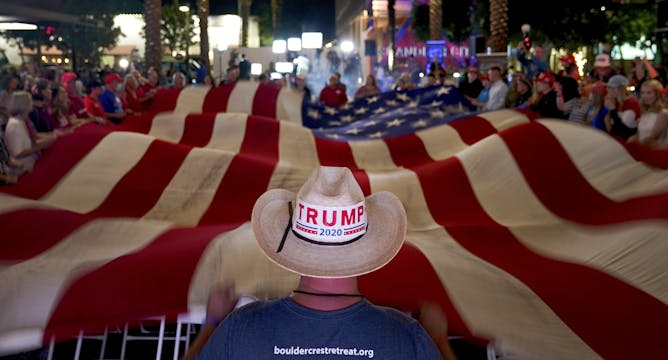
President Donald Trump supporters wave a flag during an election watch party Nov. 3, 2020, in Chandler, Ariz.
(AP Photo/Matt York)
Cheryl Thompson, Ryerson University
The closeness of the 2020 U.S. election has much to do with the way in which both Trump and Biden have invoked an imagined past.
|
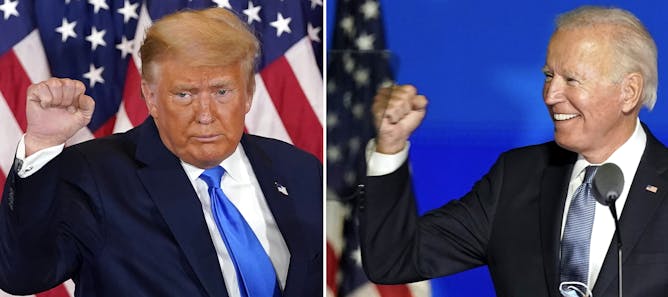
Both Donald Trump and Joe Biden put on brave faces in the hours after the U.S. election.
(AP Photos)
Thomas Klassen, York University, Canada
Whether it's a Biden or Trump presidency, the reality is that Canadian interests — on trade, global climate change, foreign affairs or other matters — don't align with America's.
|
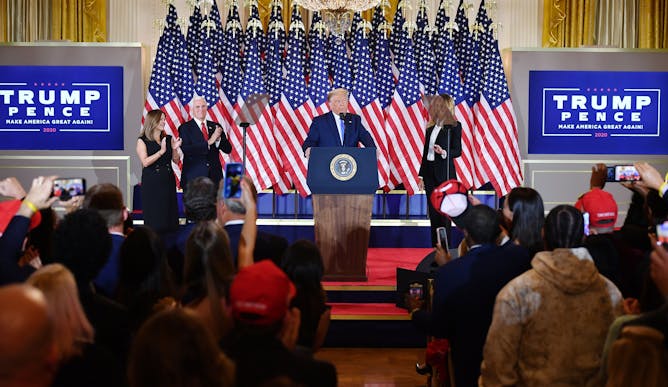
Trump falsely declaring a win in the early hours of Nov. 4, 2020, the day after the US election, as ballot counting continued in Pennsylvania and other battleground states.
Mandel Ngan/AFP via Getty Images
Alexander Cohen, Clarkson University
Five of the six disputed presidential elections in US history were resolved and the country moved on -- but one ended in civil war. What will happen if the 2020 election is contested?
|
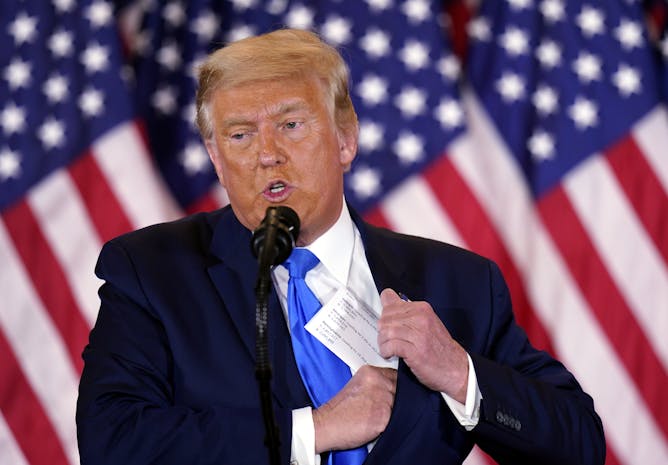
Donald Trump: a controversial speech at the White House in the early hours of November 4.
Chris Kleponis/EPA
Natasha Lindstaedt, University of Essex
Prematurely declaring election victory is a hallmark of non-democratic regimes.
|
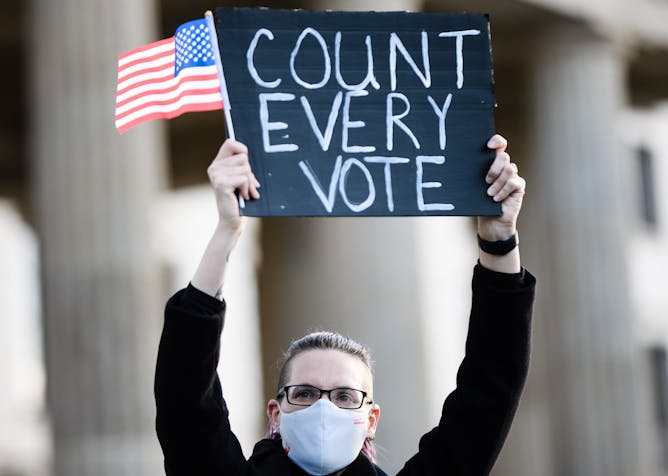
The US is facing a crisis of democratic legitimacy.
Clemens Bilan/EPA
Nadia Hilliard, UCL
The political and social crisis in the US has its roots in twin challenges.
|
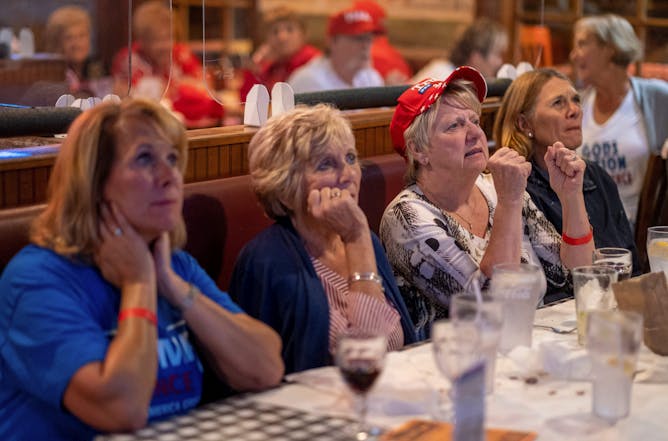
Watching the presidential election returns on election night in retirement community of The Villages, Florida.
Ricardo Arduengo/AFP via Getty Images
W. Joseph Campbell, American University School of Communication
Polls predicted a 'blue wave' that didn't materialize.
|
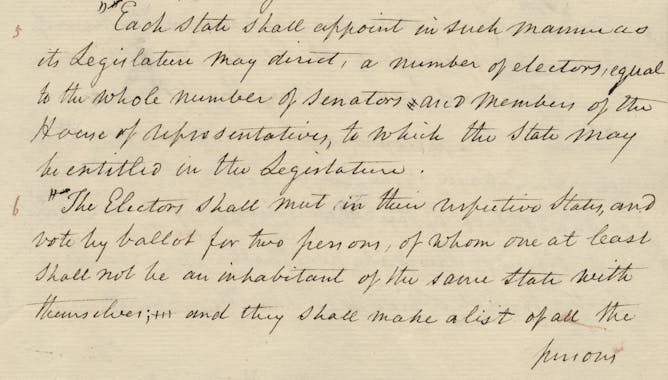
A transcript from the Constitutional Convention records the official report creating the Electoral College.
U.S. National Archives
Phillip J VanFossen, Purdue University
Three approaches were debated during the Constitutional Convention -- election by Congress, selection by state legislatures and a popular election, though that was restricted to white landowning men.
|

How do people really feel about working from home?
(Corinne Kutz/Unsplash)
Johanna Weststar, Western University; Carolyn Troup, Griffith University; David Peetz, Griffith University; Ioana Ramia, UNSW; Sean O'Brady, McMaster University; Shalene Werth, University of Southern Queensland; Shelagh Campbell, University of Regina; Susan Ressia, Griffith University
The COVID-19 crisis is transforming work and how it is done, not just in universities. If managers think that they unilaterally know how to manage remote work, disorder could become chaos.
|
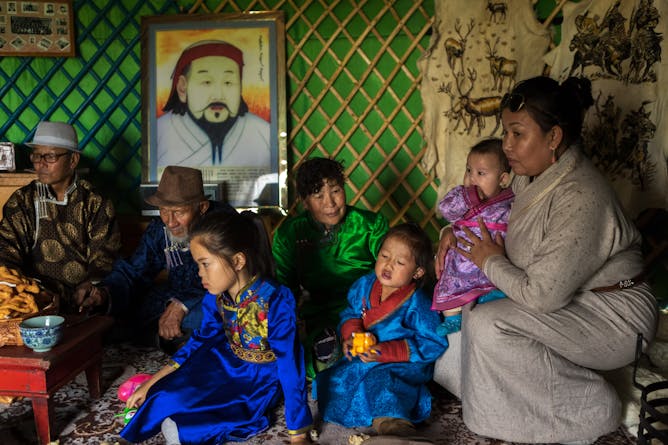
Changing the school instruction language to Mandarin will impact Mongolian children, their families and their communities.
(Shutterstock)
Shannon Ward, University of British Columbia
In Inner Mongolia, China's new bilingual education policy comes at the expense of Mongolian language and culture.
|
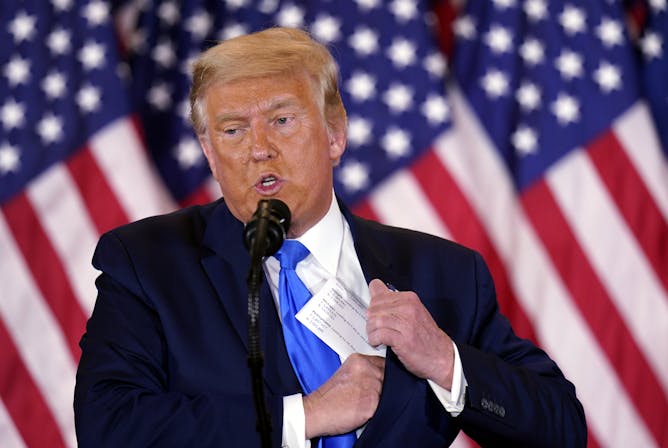
Donald Trump proclame sa victoire depuis la Maison Blanche, le 4 novembre 2020.
Chris Kleponis/EPA
Natasha Lindstaedt, University of Essex
Déclarer prématurément une victoire électorale est une pratique récurrente dans les régimes non démocratiques.
|